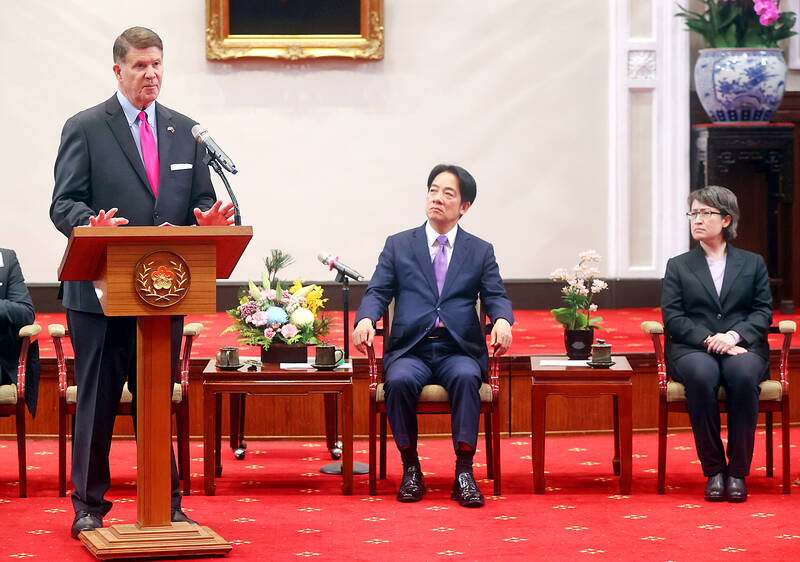Taiwan is committed to working with democratic countries to safeguard regional peace and stability, and aims to join the US-led Indo-Pacific Economic Framework (IPEF), president-elect William Lai (賴清德) told a US-Taiwan Business Council delegation yesterday.
Lai told the delegation, led by former US undersecretary of state for economic growth, energy and the environment Keith Krach, that Taiwan plays a pivotal role in preserving peace and stability in the Indo-Pacific region, and as president he would seek to maintain the “status quo” in the Taiwan Strait.
Thanking the US government for its strong support for Taiwan’s democracy, as shown in visits by high-level delegations after the Jan. 13 presidential and legislative elections, Lai said that Taiwan would work with the US to open up for more bilateral investment and to establish a more predictable investment environment.

Photo: CNA
He also asked the council for its support in enhancing the resiliency of Taiwan-US supply chains in key industry sectors, and expressed willingness to join the IPEF.
He added that Taiwan is an important and reliable partner for the US in safeguarding security and promoting economic prosperity in the region.
Krach, chairman of the Krach Institute for Tech Diplomacy at Purdue, congratulated Lai and vice president-elect Hsiao Bi-khim (蕭美琴) on winning the presidential election.
He said it was urgent that the US and Taiwan engage in “tech diplomacy.”
It was Hsiao’s first official meeting with foreign dignitaries at the Presidential Office in her capacity as vice president-elect. She and Lai had earlier received a Japanese delegation at the Democratic Progressive Party office.
In other foreign affairs news, Lai in a videoconference call invited the president of the Marshall Islands to attend his presidential inauguration on May 20.
Accompanied by Minister of Foreign Affairs Joseph Wu (吳釗燮), Lai called Marshallese President Hilda Heine, who was sworn in as president on Jan. 2, a good friend of Taiwan, adding that Taipei would continue to support the Pacific island nation.
Heine reaffirmed her nation’s firm and long-lasting friendship, and that bilateral relations remain rock-solid regardless of the test of time or external pressure, a news release issued by the Presidential Office said.
This year marks the 26th anniversary of diplomatic relations between Taiwan and the Marshall Islands, built on their common Austronesian roots and values of democracy, freedom and the rule of law, it quoted her as saying.
Her government would continue to work with Taiwan and other like-minded countries to contribute to the security and resilience of the Indo-Pacific region.
Meanwhile, President Tsai Ing-wen (蔡英文) is today to meet with the first delegation of US lawmakers to visit Taiwan since the elections.
US representatives Mario Diaz-Balart and Ami Bera, co-chairs of the US Congressional Taiwan Caucus, arrived yesterday, the Presidential Office said.
Bera and Diaz-Balart are to meet with Lai, Hsiao, Wu and other political leaders before departing today, the Ministry of Foreign Affairs said.
In a joint statement, Bera and Diaz-Balart said the trip aimed to “reaffirm US support for Taiwan following their successful democratic elections, express solidarity in their shared commitment to democratic values, and explore opportunities to further strengthen the robust economic and defense relationship between the United States and Taiwan.”
Additional reporting with CNA

Auckland rang in 2026 with a downtown fireworks display launched from New Zealand’s tallest structure, Sky Tower, making it the first major city to greet the new year at a celebration dampened by rain, while crowds in Taipei braved the elements to watch Taipei 101’s display. South Pacific countries are the first to bid farewell to 2025. Clocks struck midnight in Auckland, with a population of 1.7 million, 18 hours before the famous ball was to drop in New York’s Times Square. The five-minute display involved 3,500 fireworks launched from the 240m Sky Tower. Smaller community events were canceled across New Zealand’s

The Ministry of Foreign Affairs (MOFA) yesterday said it is closely monitoring developments in Venezuela, and would continue to cooperate with democratic allies and work together for regional and global security, stability, and prosperity. The remarks came after the US on Saturday launched a series of airstrikes in Venezuela and kidnapped Venezuelan President Nicolas Maduro, who was later flown to New York along with his wife. The pair face US charges related to drug trafficking and alleged cooperation with gangs designated as terrorist organizations. Maduro has denied the allegations. The ministry said that it is closely monitoring the political and economic situation

UNRELENTING: China attempted cyberattacks on Taiwan’s critical infrastructure 2.63 million times per day last year, up from 1.23 million in 2023, the NSB said China’s cyberarmy has long engaged in cyberattacks against Taiwan’s critical infrastructure, employing diverse and evolving tactics, the National Security Bureau (NSB) said yesterday, adding that cyberattacks on critical energy infrastructure last year increased 10-fold compared with the previous year. The NSB yesterday released a report titled Analysis on China’s Cyber Threats to Taiwan’s Critical Infrastructure in 2025, outlining the number of cyberattacks, major tactics and hacker groups. Taiwan’s national intelligence community identified a large number of cybersecurity incidents last year, the bureau said in a statement. China’s cyberarmy last year launched an average of 2.63 million intrusion attempts per day targeting Taiwan’s critical

‘SLICING METHOD’: In the event of a blockade, the China Coast Guard would intercept Taiwanese ships while its navy would seek to deter foreign intervention China’s military drills around Taiwan this week signaled potential strategies to cut the nation off from energy supplies and foreign military assistance, a US think tank report said. The Chinese People’s Liberation Army (PLA) conducted what it called “Justice Mission 2025” exercises from Monday to Tuesday in five maritime zones and airspace around Taiwan, calling them a warning to “Taiwanese independence” forces. In a report released on Wednesday, the Institute for the Study of War said the exercises effectively simulated blocking shipping routes to major port cities, including Kaohsiung, Keelung and Hualien. Taiwan would be highly vulnerable under such a blockade, because it